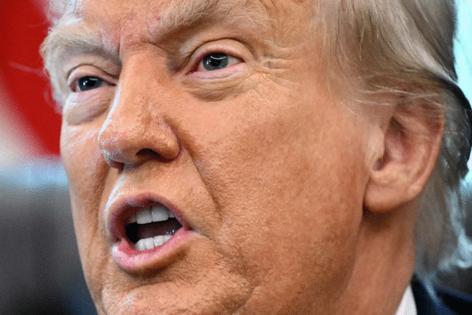David M. Drucker: Why Trump isn't turning into a lame duck
Published in Op Eds
President Donald Trump’s second term is barreling ahead with the political momentum typical of a first term — and it shows no outward signs of dissipating.
Having lost reelection in 2020 but declined to retire from campaigning, Trump has been the central, all-consuming figure in American politics for a decade. That’s longer (and counting) than a typical second-term commander in chief, which might suggest to some political observers that lame duck status is lurking around the next corner.
Voters often tire of reelected presidents, if for no other reason than the old saw “familiarity breeds contempt.” But the 45th and 47th president is exerting political influence and wielding power like a chief executive in the prime of his first term.
“I see this as President Trump getting a mulligan,” Liam Donovan, president of the Republican digital advertising firm, Targeted Victory, told me. “The things that held him back in the first term can largely be chalked up to a mix of inexperience and intra-party ambivalence. Flash forward and he suddenly has the unchallenged power, popular legitimacy, and hard-won understanding of how to use the machinery of government to achieve his goals.”
Some of that is surely due to how he used his four years out of power. Trump took office this year not only as the opposite of the novice he was on Inauguration Day eight years prior, but also more prepared than most second-term presidents in recent memory. “One of the reasons for this is not only the non-consecutive nature of Trump’s two terms, but the planning and intentionality that went into gearing up for the second term,” said Marc Selverstone, director of presidential studies at the University of Virginia’s Miller Center.
“Usually, presidents who’ve won a consecutive second term don’t have the time or focus to organize effectively for a second term,” he added. “It’s also harder to re-examine various processes and assess their effectiveness when you’re not only deeply engaged in governing but running for a second term.”
Trump has also benefited from the infrastructure of think tanks and advocacy groups, as well as a media ecosystem of friendly podcasters, online influencers and cable television networks, most of which did barely existed eight years ago but which matured as potent political allies and governing partners during former President Joe Biden’s term.
Trump is also more popular now with his party than most second-term presidents. Right around this time eight years ago, Trump’s job approval rating was roughly 80% among Republicans, 8% among Democrats and 30% among independents, according to Gallup. And now? 93% among Republicans, 1% among Democrats and 35% among independents.
That stellar 93% approval rating from Republicans is what’s fueling Trump’s unusual second-term political juice with members of his own party in the House of Representatives and US Senate. By contrast, Republican George W. Bush and Democrat Barack Obama were both at roughly 80% with voters of their own party at this point in their second term, an approximate 10 percentage point drop from their standing at the same point in their first term, per Gallup.
In other words, Trump’s endorsement can still make or break a primary campaign. Any Republican congressional or gubernatorial contender who’s doing it right has two goals in mind: Win Trump’s endorsement and then win the voters — in that order. “Any Republican he opposes will lose the primary. He won’t be a lame duck because there is a constant fear of that reality,” said Jeffrey Forbes, a veteran Democratic lobbyist in Washington.
That’s helped give Trump a stranglehold over Congress, which has only allowed his presidential clout to grow.
Then, of course, there’s the president’s constitutionally questionable assertion of emergency tariff powers, his strong-arming of corporate America by pressuring some firms to hand the government an ownership stake, his deployment of the military on American soil, and his forays into higher education, the arts and even the Federal Reserve. As Keystone College political science professor Jeffrey Brauer told me, “Trump seems to want to be president of everything.”
These and other ways in which Trump is stretching executive power are creating several avenues for political backlash against him and his party, beginning in off-year contests this November and continuing through the 2026 midterm elections and beyond.
Ironically, this would make Trump a very typical second term president after all.
____
This column reflects the personal views of the author and does not necessarily reflect the opinion of the editorial board or Bloomberg LP and its owners.
David M. Drucker is columnist covering politics and policy. He is also a senior writer for The Dispatch and the author of "In Trump's Shadow: The Battle for 2024 and the Future of the GOP."
©2025 Bloomberg L.P. Visit bloomberg.com/opinion. Distributed by Tribune Content Agency, LLC.
























































Comments